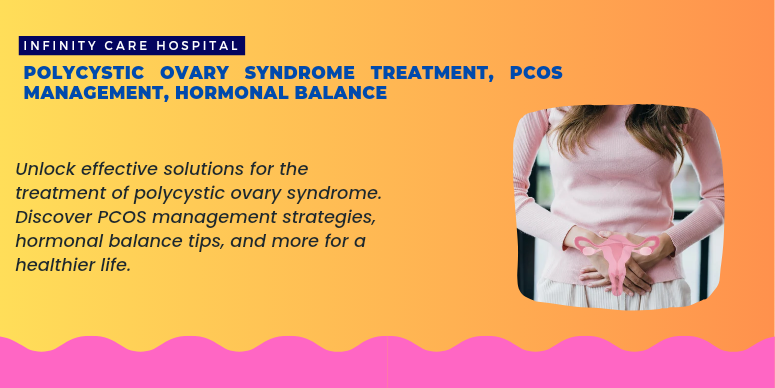[vc_row][vc_column][vc_column_text]
Unraveling the Complexity: Treatment of Polycystic Ovary Syndrome
Polycystic Ovary Syndrome (PCOS) is a common hormonal disorder that affects people with ovaries, often during their reproductive years. While there is no cure for PCOS, management strategies focus on alleviating symptoms and reducing the risk of complications. Here are some general approaches to managing PCOS:
- Lifestyle Modifications:
- Healthy Diet: Adopt a balanced diet rich in fruits, vegetables, whole grains, and lean proteins. Limit the intake of processed foods, sugars, and refined carbohydrates.
- Regular Exercise: Engage in regular physical activity to help regulate insulin levels and maintain a healthy weight. Both aerobic and resistance exercises are beneficial.
- Weight Management:
- Weight Loss: For individuals with overweight or obesity, losing even a small amount of weight can improve symptoms and hormonal balance. Consult with a healthcare professional for personalized weight management advice.
- Medications:
- Birth Control Pills: Oral contraceptives can help regulate menstrual cycles, reduce androgen levels, and alleviate symptoms such as acne and excess hair growth.
- Anti-Androgen Medications: Drugs like spironolactone may be prescribed to reduce symptoms related to excess androgen levels, such as acne and hirsutism (unwanted hair growth).
- Metformin: This medication, commonly used for type 2 diabetes, may be prescribed to improve insulin sensitivity in women with PCOS.
- Fertility Treatments:
- Ovulation Induction: If fertility is a concern, medications such as clomiphene or letrozole may be prescribed to induce ovulation.
- In Vitro Fertilization (IVF): In more severe cases of infertility, assisted reproductive technologies like IVF may be considered.
- Dietary Supplements:
- Inositol: Some studies suggest that inositol supplements may help improve insulin sensitivity and regulate menstrual cycles in women with PCOS.
- Vitamin D: Adequate vitamin D levels are important for overall health. Some individuals with PCOS may have deficiencies, and supplementation may be recommended.
- Regular Monitoring:
- Regular Check-ups: Regular follow-ups with healthcare providers are crucial to monitor and manage PCOS symptoms effectively.
- Blood Tests: Periodic blood tests may be performed to assess hormone levels, lipid profiles, and other relevant markers.
It’s important to note that PCOS management should be tailored to each individual’s specific symptoms and needs. Consulting with a healthcare professional, such as a gynecologist or endocrinologist, is crucial for developing a personalized treatment plan. Lifestyle modifications, in particular, play a significant role in managing PCOS, so working with a registered dietitian or a nutritionist can also be beneficial.
Frequently Asked Questions (FAQs)
How does PCOS impact fertility?
PCOS can affect fertility due to irregular ovulation. Seeking medical guidance for fertility interventions can enhance the chances of conception.
What role does diet play in PCOS management?
A balanced diet, focusing on whole foods and managing carbohydrate intake, can positively impact hormonal balance in individuals with PCOS.
Is weight management crucial in PCOS treatment?
Maintaining a healthy weight is often beneficial in PCOS management, as excess weight can exacerbate symptoms. However, individual responses vary.
Can natural remedies aid in PCOS treatment?
While some individuals find relief through natural remedies like herbal supplements, it’s essential to consult with healthcare professionals to ensure safety and efficacy.
How does stress contribute to PCOS symptoms?
Stress can exacerbate PCOS symptoms by influencing hormonal balance. Implementing stress-reduction techniques, such as mindfulness and meditation, may be beneficial.
What are the long-term implications of untreated PCOS?
Untreated PCOS can lead to complications like diabetes and cardiovascular issues. Timely management is crucial for mitigating potential risks.
Conclusion: Empowering Individuals on the PCOS Journey
Navigating the landscape of PCOS treatment requires a personalized, holistic approach. By integrating lifestyle adjustments, medical interventions, and personal insights, individuals can empower themselves on the journey to hormonal balance and overall well-being.[/vc_column_text][/vc_column][/vc_row]




